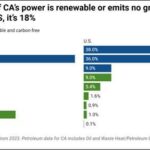The energy contracting model allows for greater predictability, cost reduction and supplier selection
The free energy market has become an increasingly popular alternative in Brazil, allowing companies and consumers to choose who they buy electricity from. Unlike a regulated market, in which tariffs are set by the local distributor, a free contracting environment allows direct negotiation between consumers and generators or energy traders, which can lead to significant savings.
According to Uberto Sprung Neto, CEO of Spirit Energia, a company that advises on contracts for this market, enterprises that choose a free energy contracting environment can save between 30 and 40% on energy tariffs. “This model offers a real savings opportunity for companies. With a well-organized strategy, it is possible to reduce electricity costs by 30-40%, generating a significant impact on the competitiveness and financial management of the company,” explains the CEO.
One reason for this economy is competition among energy suppliers, who are promoting more competitive prices. Moreover, consumers have the possibility to choose renewable energy sources, which also contributes to environmental sustainability.
Alles Park, a client of Spirit Energia, is a theme park with an area of more than 5 thousand square meters and many attractions, which makes the monthly energy cost high. According to Sprung, in addition to the energy used by the attractions themselves, more than a kilowatt is needed to operate the park weekly. “Through consultation, it was possible to reduce 30% of the final value of the park’s energy bill.”
Small and medium enterprises can enter the free energy market
In January 2024, Brazil’s free energy market began serving small and medium-sized enterprises. Businesses such as shopping malls, hospitals, restaurants and gas stations, for example, can benefit from this method, which was previously only valid for businesses that consume at least 500 kilowatts per month.
“For this group to be served in 2024, the free energy market represents an opportunity to increase competitiveness. The energy bill savings can be reinvested in other areas of the company,” explains Sprung.
Moreover, the expansion of the free market allows consumers greater autonomy. Businesses can choose their suppliers based on price, energy source, and even the reputation of the supplier.
“By migrating to the free market, these companies also gain greater predictability of energy costs, as it is possible to negotiate contracts with distributors at fixed prices. This allows the business to work on better budget management, make more accurate financial forecasts and avoid the effects of frequent fluctuations.” In tariffs in the regulated market.. (consultative)



